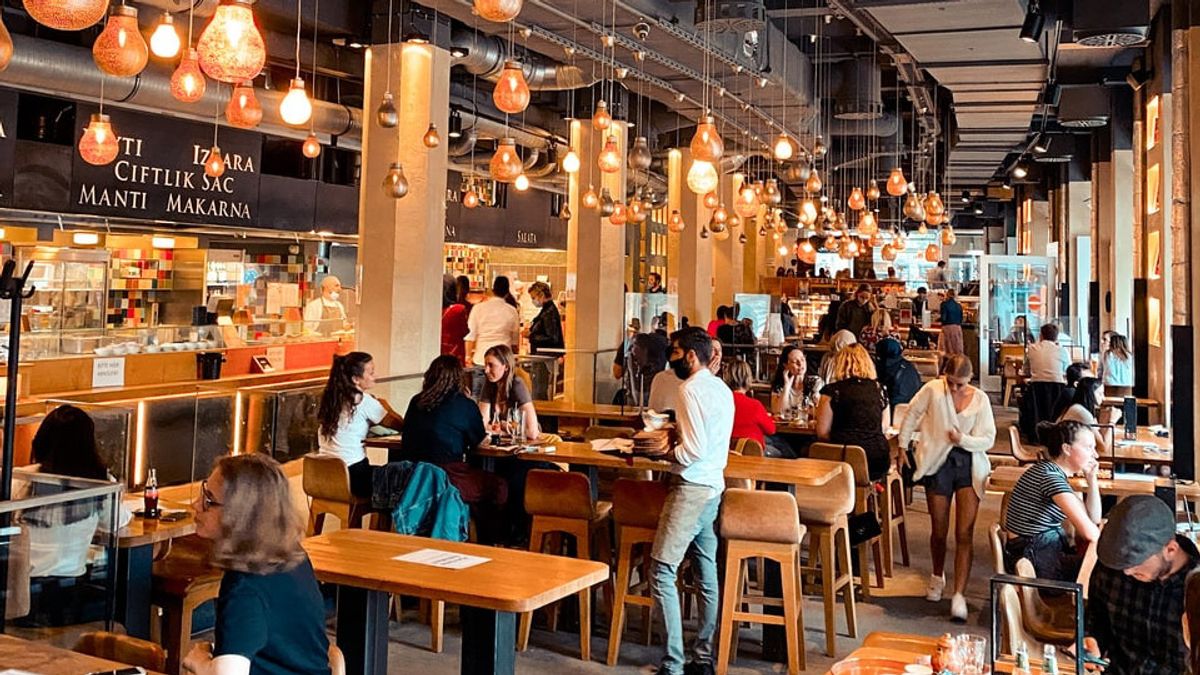JAKARTA - Two years later, the COVID-19 pandemic has hit the world. During that time, the cafe and restaurant industry suffered a heavy blow. A number of restrictions on social activities are the main factor in the decline of this industry, even though many entrepreneurs are trying to compensate for the decline in income by boosting online sales.
Now, after the number of COVID-19 cases has started to decline and the government has implemented a relaxation of restrictions on community activities, the sense of optimism for the rise of the cafe and restaurant industry has re-emerged. It is also believed that the cafe and restaurant business for dine-in, aka eating out, has good prospects, along with the desire of many people who want to return to socializing as before, after about two years of having to resist this desire.
Business actors can also run offline businesses which again have great potential with an online system built to adapt to the times and the blows of the pandemic. According to him, digitalization in this business is a necessity that must be done. However, the potential for the dine-in market after the pandemic cannot be ignored.
"Now is the time to go back to running the cafe and restaurant business offline again. There's nothing wrong with online and offline systems running simultaneously," said the Head of the Apkulindo Business Training Division (Association of Indonesian Culinary Entrepreneurs) Giri Buana Center in a webinar entitled 'Exploring Tips for Rising Cafe Businesses & Restaurants in the Pandemic Era' held by Validnews, Wednesday 30 March.
He ensured that PPKM regulations that limited community activities were the main factors that hindered the running of the cafe and restaurant business. Well, in early 2022, after everything has been relaxed, the potential in this business is growing again.
"This is an opportunity, because one of the biggest market shares is the activities of school and office children. It makes us optimistic to rebuild the culinary business. As long as we have a clear concept and target market," he exclaimed.
To note, throughout 2019, before the pandemic occurred, the total number of food and drink providers in Indonesia was 4,008,927 businesses. This number consists of 12,602 large medium scale enterprises (UMB) and 3,996,325 small medium scale enterprises (UMK).
During that year, the accumulated growth of the food and beverage industry (mamin) managed to touch 7.78 percent (cumulative to cumulative/coc). However, this growth was suddenly disrupted by COVID-19, so that in 2020 the national food and beverage industry only grew 1.58 percent (COC).
"In addition to maintaining health, we predict that the decline in food and beverage industry growth will also occur because people reduce spending. This is the result of our analysis based on the decline in the Consumer Confidence Index (IKK) and an increase in total bank deposits in early 2022," said Rikando Somba, CEO of the Center Research Vision Thoroughly.
This is in line with data from the Deposit Insurance Corporation (LPS) as of January 2022 which states that the total value of commercial bank deposits is recorded at Rp7,439 trillion. This amount increased by Rp. 800.4 trillion or an increase of 12.06 percent (yoy).
According to him, the growth in the number of deposits is inseparable from the existence of divided attitudes in society. On the one hand, there are community groups who are optimistic that conditions are safe and the pandemic will end soon. On the other hand, there are still groups of people who are still worried about the pandemic.
Uniquely, from the results of the existing survey, said Rikando, these two groups both have the desire to go out to enjoy culinary dine-in at a cafe or restaurant to unwind. This attitude is the great potential of the offline cafe and restaurant business.
"From these two groups, there is one thing in common, both of them actually want to go out to enjoy culinary delights, travel and so on. Of the several segments of respondents we researched, there are those who spend 1-5 million per month per individual for culinary tours or coffee. which costs up to IDR 30 million even though the amount is only 3 percent," said Rikando.
Another similarity is that even though they dare to visit cafes or restaurants and eat dine-in, the majority of the two groups share an attitude of attaching importance to health protocols by using masks or using hand sanitizers.
"Uniquely, there is a crowd factor as a determinant. When they see a cafe to be visited, its capacity is more than 75 percent, as many as 88.39 percent of respondents chose to cancel their intention to visit and look for other locations," he added.
Boost digitizationMeanwhile, in the midst of focusing on working on the business potential of conventional cafes and restaurants, Destry Anna Sari, Assistant Deputy for Business Consultation and Assistance for the Deputy for Entrepreneurship at the Ministry of Cooperatives and SMEs, reminded SMEs, especially in the culinary sector, to be serious about digitizing their business.
He said that currently there are 64.2 million MSMEs in Indonesia. This number covers 99.9 percent of businesses in the archipelago. Unfortunately, out of 99 percent of the business population, only 18.83 percent are already digitally connected.
"The culinary sector is a potential winner during a pandemic, especially one that pays attention to health aspects, is environmentally friendly and nature-based," he said.
With digitalization being carried out, he also said, culinary MSME actors could have wider market access. In fact, you can access government procurement of goods and services online. He guaranteed that at this time the government would prioritize local products, especially from MSMEs to fill the needs of government goods and services.
"The government's procurement of goods and services is worth up to Rp. 400 trillion per year. This includes food and beverage needs there. Restaurants and cafes can offer food and drink packages for government events," said Destry.
Giri Buana also agreed, digitalization cannot be ignored by culinary business actors even though the effects of the pandemic have begun to subside.
"Pandemics teach us to be smart in doing efficiency. The ghost kitchen concept for culinary businesses, for example, cuts a lot of investment and overhead costs. That's why it is very developed abroad. Not just because there is a pandemic but it's time for an era like this," he said.
In addition, he also advised cafe and restaurant businesses to continue to innovate on their products.
"Don't be too sure our products are strong. Innovation is still necessary. Don't think we have gone digital by registering on GoFood or GrabFood, we just sit back. We have to master many technical things, such as product photos and good graphics online," he said.
Finally, he reminded culinary business actors to pay attention to the standardization of their food and beverage products.
"Although in the cafe and restaurant business there are things that we can sell, such as comfort, aesthetics or an outdoor atmosphere, food products are still important. If they are good they will come back and the taste must be consistent (standardized)," he concluded.
The English, Chinese, Japanese, Arabic, and French versions are automatically generated by the AI. So there may still be inaccuracies in translating, please always see Indonesian as our main language. (system supported by DigitalSiber.id)









